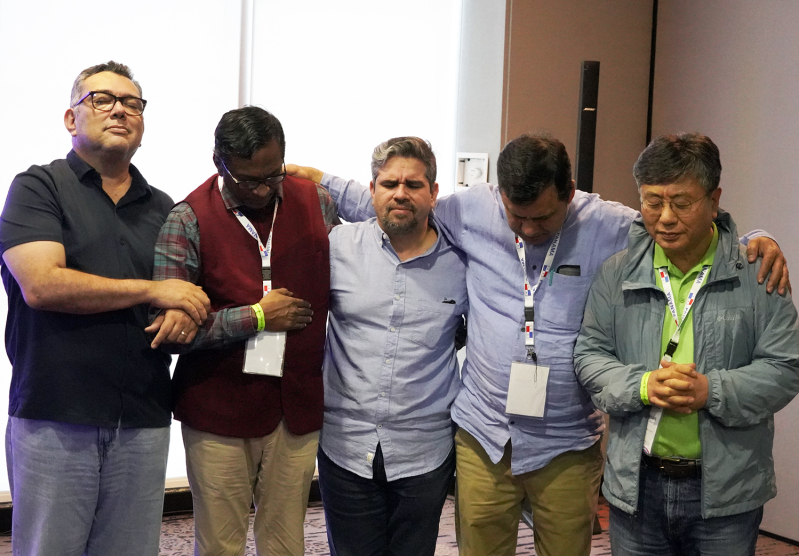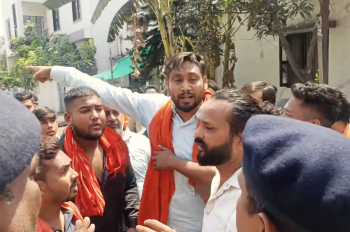
The third edition of the COALA missions gathering—Christ Over Africa, Latin America, and Asia—concluded Tuesday evening with a symbolic communion service and a renewed call to action, marking the end of three days of thematic and regional presentations, strategic discussions, and bold steps toward greater intercontinental collaboration in missions.
Hosted alongside the Ibero-American Missionary Congress COMIBAM 2025, COALA3.0 drew participants from across the Majority World. The final day featured continued table group reflections and culminated in a landmark announcement: COMIBAM and the India Missions Association (IMA) will sign a memorandum of understanding on April 30, formalizing an intentional partnership between Latin American and Indian churches—a tangible outworking of the COALA vision.
“This kind of mission activity should be a model outside of Latin America and India as well,” said Rev. Jonas Kang of the Korea World Missions Association, a key COALA leader. “Both are looking to reach the Unreached People Groups. They will exchange strategies, send missionaries to each other. It is wonderful.”
Latin America and India step forward together
The upcoming memorandum represents a significant milestone: the first formalized COALA-driven collaboration across continents, illustrating the movement’s ambition to enable South-to-South mission engagement.
Cristian Castro, executive director of COMIBAM and host of COALA3.0, called the agreement a natural next step in a long-standing relationship between the two mission associations.
“The signing of the document implies a commitment to respond in a serious manner,” Castro told Christian Daily International. “We will promote the opportunities that come with this agreement to churches and national movements throughout Latin America.”
The partnership aims to facilitate the sending of Latin American missionaries to India with support from IMA, including help with visas, logistics, and on-the-ground connections. In return, Indian workers will be encouraged to serve in Latin American countries where Hindu and Indian communities are growing, offering churches training and practical assistance.
“In many cultures, signing a document is very important—and we honor that,” Castro said. “We are learning the value of these formal commitments.”
Identity still in formation
Despite the progress, COALA3.0 revealed that questions remain about the identity and structure of the movement. While enthusiasm and vision were evident, participants noted the need for clearer definition of COALA’s role in the global mission landscape.
“People sometimes ask us, ‘What is COALA? Who are the people involved with COALA?’” said Kang. “This time, we started to define what it means. What is the DNA of COALA? What will be going on in the future? Everything will go step by step.”
Manik Corea, a leader from Singapore who will host COALA4.0, echoed that sentiment.
“What COALA3.0 showed us is that we need to clarify identity—who we are,” Corea said. “But people are also anxious that we begin to make some steps forward. The urgency of the hour is real. We can’t keep waiting.”
Still in its early years, the COALA movement has grown steadily since its inception three years ago, maturing through each of its gatherings. Kang acknowledged the role of increased awareness and reporting in strengthening the network: “Many people now understand and are positive about COALA. They try to bring the movement to other regions.”
Looking ahead: COALA3.5 and COALA4.0
Momentum will continue later this year, with plans underway for COALA3.5 to potentially take place as a dedicated track during the World Evangelical Alliance General Assembly in Seoul, South Korea this October. While not a full standalone event, the gathering will allow COALA participants to further solidify their identity and discuss collaborative action within a broader global evangelical gathering.
The next full COALA summit—COALA4.0—is scheduled for Singapore, with Corea and his team from the Singapore Centre for Global Missions preparing to host.
“We hope to build on what we did here,” said Corea. “We want to deepen relationships and answer the next big question: What do we do, and what do we do together?”
Singapore’s strategic position makes it a natural location for the next step. As a former hub of Western mission organizations and a growing center for indigenous Asian missions, the country offers fertile ground for interregional connection.
“We’re a small nation, but Singapore has a strategic place in God’s plan,” Corea said. “Let COALA come so that there can be a mingling and that some of what’s going on here can fuel the flame that’s burning at home.”
A gathering of global voices
For Castro, the experience of hosting COALA3.0 in Latin America was both a privilege and a sign of trust in the region’s maturity.
“It shows these movements believe in us,” he said. “To have fifty global leaders in one room—thinking about how many churches and missionaries they represent—is a powerful thing.”
The event also began to include space for emerging leaders, with one plenary presentation given by a younger, female pastor from Taiwan. Kang highlighted the importance of involving younger generations and ensuring a quota for youth participation in future COALA gatherings.
“We’re getting older, and the young people, whether they want to or not, will take responsibility one day,” Kang said. “We need to let them see what’s going on, bring them alongside now.”
Communion and commission
The final evening of COALA3.0 ended in communion—a moment of spiritual unity that closed three days of visionary planning, cultural exchange, and relationship building. For those present, it served as both a celebration and a recommissioning.
The movement’s future may still be unfolding, but its direction is becoming clearer. With practical partnerships forming, regional initiatives emerging, and a growing sense of urgency, COALA is emerging not only as a network, but as a catalytic force for collaborative mission from the Majority World to the ends of the earth.
“We are finally trying to articulate who we are to the rest of the church,” said Corea. “Hopefully it will be helpful to everybody.”





